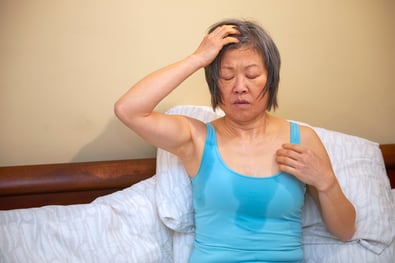Side Effects of Adjuvant Therapy and How to Manage Them
5 min read

Advice from Dr. Jenny Fox, Oncologist at Rocky Mountain Cancer Centers in Boulder
 Adjuvant therapy is any type of treatment designed to prevent the return of cancer after it is removed (with surgery) or eradicated (with chemo or radiation). While adjuvant therapy can be helpful with a variety of types of cancer, its efficacy in preventing the return of hormone-positive breast cancer is particularly remarkable. For example, when used with patients for stage 1 hormone-positive breast cancer, anti-hormonal adjuvant therapy reduces recurrence by more than 40-50% leading to a five-year survival rate of over 98%.
Adjuvant therapy is any type of treatment designed to prevent the return of cancer after it is removed (with surgery) or eradicated (with chemo or radiation). While adjuvant therapy can be helpful with a variety of types of cancer, its efficacy in preventing the return of hormone-positive breast cancer is particularly remarkable. For example, when used with patients for stage 1 hormone-positive breast cancer, anti-hormonal adjuvant therapy reduces recurrence by more than 40-50% leading to a five-year survival rate of over 98%.
Despite the incredible benefits of adjuvant therapy, up to one out of three women end it early because of the side effects.
When used with patients for Stage I Hormone-positive Breast Cancer, anti-hormonal adjuvant therapy reduces recurrence by more than 40-50% leading to a 5-year survival rate of over 98%.
Therefore, managing the side effects of adjuvant therapy is crucial for more women to realize the life-saving benefits of completing their recommended treatment.
After 18 years at RMCC, Dr. Jenny Fox, an oncologist with a focus on breast cancer, has counseled countless patients on the benefits of adjuvant therapy and how to manage the side effects.
Adjuvant Therapy for Breast Cancer: The Basics
When treating hormone-positive breast cancer, the goal is to prevent the stimulation by hormones that feed cancer growth. To do this, two types of medications are available:
- Tamoxifen, which blocks estrogen, is usually used five to 10 years, and is an option for both premenopausal and postmenopausal women.
- Aromatase inhibitors decrease estrogen production, are usually used for five years, and are only effective in postmenopausal women.
While a small percentage of the side effects of adjuvant therapy for breast cancer are potentially dangerous and require careful consideration and management by a patient and their physician, the most common ones are not dangerous and can be made more tolerable with some fairly simple modifications.
Side Effects of Adjuvant Therapy
Despite the incredible benefits of adjuvant therapy, one out of three women end it early because of the side effects.
Though there is some overlap between the side effects of estrogen blockers and aromatase inhibitors, the two types of adjuvant therapy for breast cancer often have different potential side effects.
Tamoxifen is known to cause:
- Hot flashes
- Blood clots (2-3% increase)
- Uterine cancer (2-3% increase)
- Positive side effect: increase in bone density
Side effects of aromatase inhibitors include:
- Hot flashes
- Joint stiffness
- Negative effect on bone density
- Sexual side effects (vaginal dryness, etc.)
How to Manage the Most Common Side Effects of Adjuvant Therapy
Dr. Fox provides suggestions for how to manage the most common side effects of adjuvant therapy she sees among her breast cancer patients: hot flashes, joint stiffness, and vaginal dryness.
Managing the side effects of adjuvant therapy is crucial if more women are to realize the life-saving benefits of completing recommended adjuvant therapy.
Hot Flashes

Hot flashes are a very common side effect of adjuvant therapy, with 30-40% of women experiencing them. While hot flashes can be uncomfortable, they’re not dangerous, and simple tricks like dressing in layers and using handheld fans can go a long way to improve comfort. Additionally, some supplements and prescription medications can improve hot flashes, including:
- Black cohosh
- Vitamin E
- Grapeseed extract
- Effexor
- Neurontin
- Oxybutynin
- Clonidine
Weight loss can also improve hot flashes and overall health. Additionally, acupuncture can be an effective treatment for hot flashes.
Joint Stiffness
The joint stiffness that often accompanies the use of aromatase inhibitors for adjuvant therapy is, fortunately, neither permanent nor causes long-term damage, Dr. Fox reassures her patients. Thus, once adjuvant therapy is completed, joint stiffness goes away. Additionally, this side effect is usually tolerable and often improves over time, with many women noting improvement by 18 months. In the interim, Dr. Fox has the following suggestions to ease joint discomfort:
- Increasing exercise, morning stretching
- Weight loss
- Acupuncture
- Avoiding vitamin D deficiency
- Using over-the-counter anti-inflammatories and prescription duloxetine
- Switching to a different aromatase inhibitor or to tamoxifen
Vaginal Dryness
Sexual side effects, including vaginal dryness, are very common with adjuvant therapy, according to Dr. Fox. While this side effect can cause both physical and emotional discomfort around sex and intimacy, cancer patients are fortunate that it not dangerous nor without solutions. Suggestions include:
- Use lubricants as needed. A variety of products and brands are available from water-based lubricants like KY Jelly, oil-based lubricants like coconut oil (but should NOT be used with condoms), and silicone-based lubricants like Astroglide X.
- Regularly apply moisturizers (think of it like lotion for dry skin). Options include oil-based moisturizers like coconut oil as well as a variety of over-the-counter brands like Replens, KY-liquibeads, etc.
- Mona Lisa touch laser treatment. While this treatment is not covered by insurance, Dr. Fox says that some patients may find it helpful.
While there are many options available to improve the side effects of adjuvant therapy, Dr. Fox recommends her patients try out some of these suggestions before considering stopping their recommended adjuvant therapy early.
Learn more about neoadjuvant and adjuvant therapy at Rocky Mountain Cancer Centers.